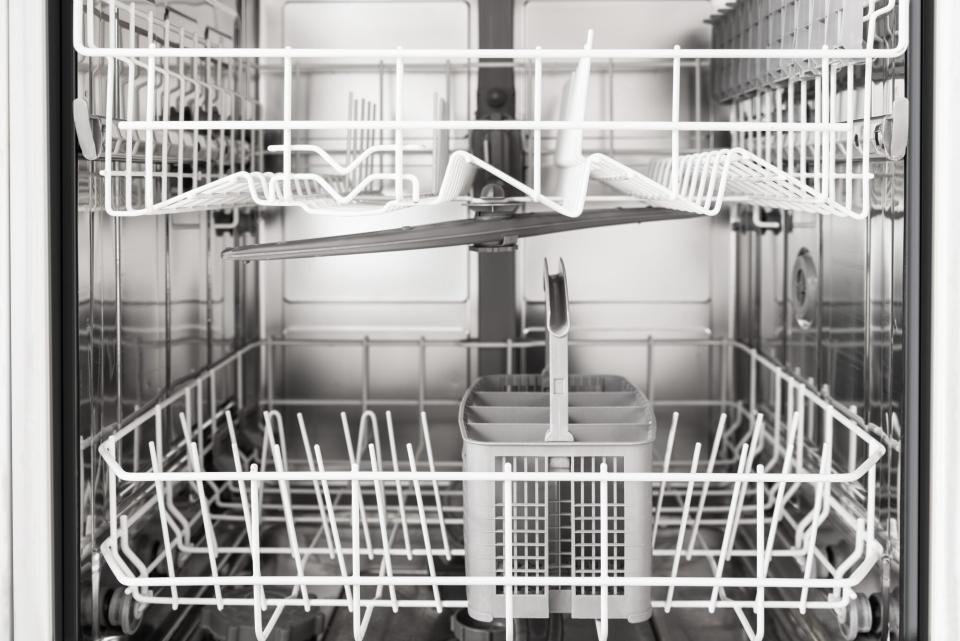How to Clean a Dishwasher With Vinegar and Baking Soda
TABLE OF CONTENTS
On This Page
How Often to Clean Your Dishwasher
What You Need
How to Clean Your Dishwasher With Vinegar and Baking Soda
Tips to Keep Your Dishwasher Clean Longer
If we know anything, it's that there's always hope. Brighter days are ahead—at least, that's what I keep telling myself in regard to my apparent disgustingly grimy dishwasher that hasn't been cleaned since it was purchased over five years ago. The problem is that it doesn't smell. That sounds a little strange, but the one good thing about a stinky dishwasher? It serves as a reminder to give it a good deep clean.
Whether your dishwasher smells or not, food gradually accumulates and collects in spots like the drain, spray arms, and baskets, feeding mold and bacteria and reducing the flow of water. Here we're going to get down to the nitty-gritty (or grimy, as it were) on how to get your dishwasher back in tip-top shape. We're talking about how to clean your dishwasher, but also how to clean a dishwasher filter, how to clean a dishwasher drain, and how to clean the inside of a dishwasher. All of your bases will be covered here. And in case you're wondering, these steps will help clean a smelly dishwasher—if you're one of the lucky ones who gets nudged by your machine when it's ready for a good clean.

AndreyPopov/Getty Images
How Often to Clean Your Dishwasher
Many experts recommend cleaning your dishwasher once a month to keep it sanitary and running efficiently. But if you rarely use your dishwasher, you might only need to clean it a couple of times a year. At the same time, if you notice grimy gaskets, clogged spray arms, or an unpleasant odor each time you open the door, it's time to step up your dishwasher-cleaning schedule.
What You Need
White cleaning vinegar
Baking soda
Old toothbrush
Optional: toothpicks
How to Clean Your Dishwasher With Vinegar and Baking Soda
Pull out the bottom rack of the dishwasher and pull out anything that's caught in the drain. Getting the drain clear of debris will help improve your machine's efficiency and overall functionality, so don't even think about skipping this step.
Check the utensil holders and rinse out any trapped food in the sink. Use the toothbrush to dislodge anything that's stuck.
Determine what kind of dishwasher filter you have: self-cleaning or manual. Self-cleaning filters act as a garbage disposal and don't have food buildup that needs to be cleaned. If you have a manual filter, remove it and give it a light scrub with a toothbrush. Soak it in hot, soapy water for about 20 minutes, then give it another good scrub to remove any remaining buildup. Rinse it clean under warm water and then place the filter back in the dishwasher.
To clean the gasket, mix a 1/2 cup of vinegar with 3 cups of hot water in a bucket or container. Using your toothbrush and the solution, gently loosen and wipe away any grime in the gasket.
Check spray arms to see if any holes appear clogged. Use a toothpick to clear clogs.
Pour a cup of cleaning vinegar into a dishwasher-safe cup and place it in the top rack of the dishwasher. Run your dishwasher on the hottest setting (run your sink on hot for a minute or two first to make certain hot water has reached the kitchen).
Once your vinegar cycle ends, open the dishwasher and sprinkle a cup of baking soda over the bottom of the machine to remove any odors. Run it on the hottest setting again. Open the door after and allow the dishwasher to air dry.
Now give yourself a big pat on the back. You've just successfully cleaned your dishwasher.
Tips to Keep Your Dishwasher Clean Longer
First and foremost, scrape those dishes. You don't need to rinse them, but scraping off all the food bits will help prevent food from accumulating in the filter and other spots. Check the filter regularly and rinse it out any time food is trapped there. Finally, if you have hard water that tends to cloud or spot your dishes, use dishwasher salt to keep mineral deposits from building up.
In case you missed it, learn how to clean your washing machine here. What appliance should we tackle next? Maybe the fridge? What about the dryer? How about the oven? Let us know what your next project is and we'll find the best way to get the job done.

